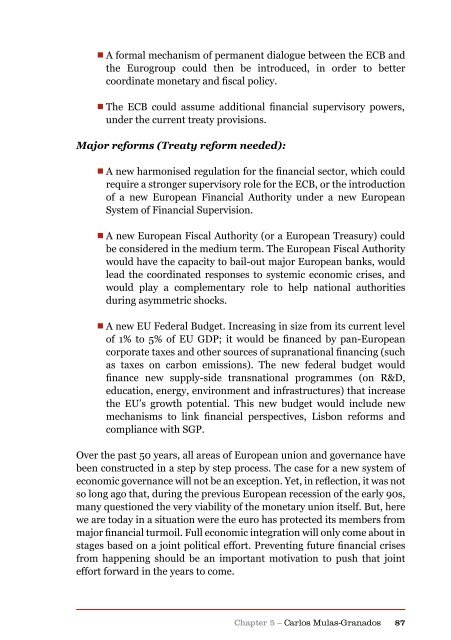Authors Iain Begg | Gabriel Glöckler | Anke Hassel ... - The Europaeum
Authors Iain Begg | Gabriel Glöckler | Anke Hassel ... - The Europaeum
Authors Iain Begg | Gabriel Glöckler | Anke Hassel ... - The Europaeum
You also want an ePaper? Increase the reach of your titles
YUMPU automatically turns print PDFs into web optimized ePapers that Google loves.
n A formal mechanism of permanent dialogue between the ECB and<br />
the Eurogroup could then be introduced, in order to better<br />
coordinate monetary and fiscal policy.<br />
n T he ECB could assume additional financial supervisory powers,<br />
under the current treaty provisions.<br />
Major reforms (Treaty reform needed):<br />
n A new harmonised regulation for the financial sector, which could<br />
require a stronger supervisory role for the ECB, or the introduction<br />
of a new European Financial Authority under a new European<br />
System of Financial Supervision.<br />
n A new European Fiscal Authority (or a European Treasury) could<br />
be considered in the medium term. <strong>The</strong> European Fiscal Authority<br />
would have the capacity to bail-out major European banks, would<br />
lead the coordinated responses to systemic economic crises, and<br />
would play a complementary role to help national authorities<br />
during asymmetric shocks.<br />
n A new EU Federal Budget. Increasing in size from its current level<br />
of 1% to 5% of EU GDP; it would be financed by pan-European<br />
corporate taxes and other sources of supranational financing (such<br />
as taxes on carbon emissions). <strong>The</strong> new federal budget would<br />
finance new supply-side transnational programmes (on R&D,<br />
education, energy, environment and infrastructures) that increase<br />
the EU’s growth potential. This new budget would include new<br />
mechanisms to link financial perspectives, Lisbon reforms and<br />
compliance with SGP.<br />
Over the past 50 years, all areas of European union and governance have<br />
been constructed in a step by step process. <strong>The</strong> case for a new system of<br />
economic governance will not be an exception. Yet, in reflection, it was not<br />
so long ago that, during the previous European recession of the early 90s,<br />
many questioned the very viability of the monetary union itself. But, here<br />
we are today in a situation were the euro has protected its members from<br />
major financial turmoil. Full economic integration will only come about in<br />
stages based on a joint political effort. Preventing future financial crises<br />
from happening should be an important motivation to push that joint<br />
effort forward in the years to come.<br />
Chapter 5 – Carlos Mulas-Granados 87

















